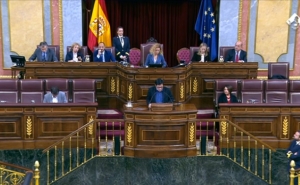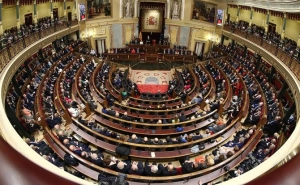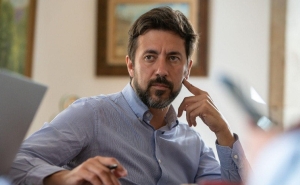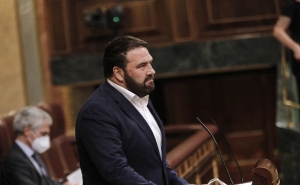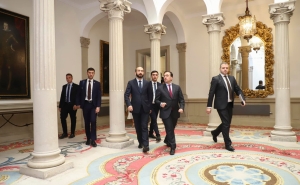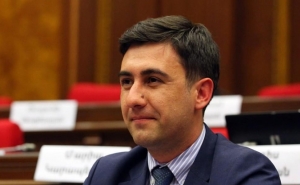Catalonia – Madrid: On the Eve of the Referendum
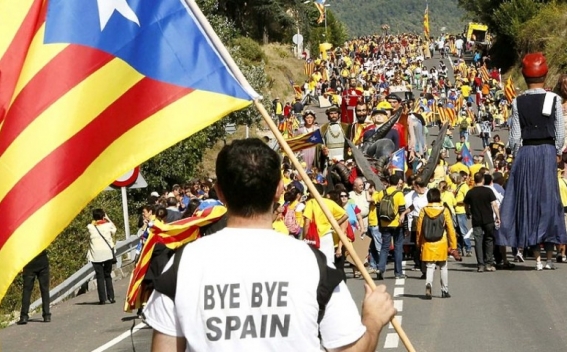
Attorney General of Spain Jose Manuel Maza said he is considering the possibility of arresting the President of Catalonia Carles Puigdemont because of the intention to hold a referendum on the independence of the region. He said, that "such a decision can be made, but at the moment it is not necessary," RFI reports.
The referendum on the independence of Catalonia will be held on October 1, despite a direct prohibition of the Prime Minister of Spain and the ruling of the Constitutional Court on its illegality. These actions of Madrid caused a wave of protest in the region, as up to 80% of Catalans are for holding the referendum. At the same time, according to the preliminary estimations, only 41% of local residents advocate for secession from the country, 49% are against it. The mayor of Barcelona, Ada Colau, has already called on the Catalans to come out to the streets and fight for their rights, mass demonstrations of supporters and opponents of independence have already come out of the borders of the region.
On this background, Spanish Prime Minister Mariano Rajoy made a sharp statement, BBC reports. "I want to say calmly and firmly: there will be no referendum, it will not take place," he noted.
It should be mentioned that in case of leaving Spain, Catalonia will face problems not only with Madrid, but also with the EU. It has already been announced in Brussels that if the Catalans vote for the secession from Spain, they will have to leave also the European Union.
Since 2004, in the European Union the so-called "Barroso Doctrine" works: the rule suggests, that any new country formed as a result of separation from another EU member state, cannot automatically join the European Union.
Today the European Commission repeats this doctrine almost daily. And even if Catalonia decides to become an EU member after independence, Spain will definitely hinder it, using the right to veto. And, as it is known, the consent of all Member States is necessary for becoming a member of the EU. Nevertheless, the Catalan government is confident that as a result of the referendum, 7,5 million Catalans living in the north-east of the Iberian Peninsula will be able to get out from the federal state of Spain and at the same time retain the citizenship of the European Union.
Earlier, Russia announced that the possible referendum on Catalonia's independence is Spain's internal affair, and they will not interfere in it. Such announcement was made also by the US. But now the US President Donald Trump said that the United States opposes an independence drive in the Spanish region of Catalonia, telling that such a secession would be "foolish." "I think Spain is a great country, and it should remain united," Trump said during a news conference with the visiting Spanish Prime Minister Mariano Rajoy, "The Washington Post" reports.
It should be noted, that it is not the first time that the region is trying to separate from Spain. In 2006, the authorities of Spain and Catalonia signed an agreement that provided the region with significant administrative and financial independence, but in 2010 the Constitutional Court of Spain overturned some of the provisions of this document, causing strong dissatisfaction with the Catalans. Informal referendums on independence were already held in 2009 and 2011. In 2014, the plebiscite attempt was blocked by the Constitutional Court of Spain, so instead of it, a "civil poll" was held in Catalonia: almost 81% voted in favor of secession from Spain.
On September 6 of this year, the Catalan Parliament adopted a law on the transitional period, which, according to the supporters of the region's sovereignty, would help to create a legal basis for the withdrawal of the region from Spain. Then the head of the government of Catalonia signed a law on holding a referendum, saying that the decision to hold a new referendum was unilaterally taken after unsuccessful attempts to agree on the organization of voting with the central government in Madrid. The next day, the preparation of the referendum was suspended by the Constitutional Court of Spain.
According to the supporters of the referendum, Madrid does not sufficiently respect its language and culture. Since the XV century Catalonia has been an important part of Spain, but supporters of independence argue that the region periodically suffers from Madrid's attempts to make it "more Spanish." In addition, Catalonia pays to the state budget more than it receives for the development of the region.
However, it is an undeniable fact that the Catalans are not going to withdraw their decision to hold a referendum. In the case of positive results of the referendum, the Catalan authorities promise to immediately begin the process of withdrawal from Spain, even if it is unilateral. And regardless of the outcome of this referendum, Madrid's current stance and tough policy further aggravate the strained relations with the region that seeks independence.
Other materials on this subject
- EU Parliament Lifts Former Catalan Leader's Immunity The three fled to Belgium in 2017 to avoid arrest in relation to their role in organising a 2017 independence referendum deemed illegal by a Spanish court and have been the subject of European arrest warrants...
- Catalan Separatists Approve Talks with Spanish Socialists But Demand Secession Negotiation ERC official Marta Vilalta said the results showed that, unless the Socialists accept its demands, the party will uphold its refusal to facilitate Sanchez’s bid to form a government.
- Catalan Independence Protesters Block Major Spain-France Road Link Catalonia has been rocked by mass protests since long prison sentences were handed down in mid-October to nine separatist leaders who spearheaded a failed independence bid in 2017.
- Barcelona Rocked by Violence as Catalan Protesters Clash with Police The general strike that brought the Catalan capital to a standstill drew over half a million people, according to police estimates, and was largely peaceful for most of the day.
- Catalan New President Did Not Mention of Obeying the Spanish Constitution Torra, a hardline Catalan nationalist handpicked by the region’s deposed president, Carles Puigdemont, was elected by 66 votes to 65 on Monday and assumed office at a low-key ceremony in Barcelona on...
-
 17:08
17:08The regular session of the Anti-corruption Policy Council takes place in Jermuk
-
 15:05
15:05The Prime Minister sends congratulatory messages to the supreme leader of Iran and the President of Iran
-
 11:11
11:11Armenia sends earthquake aid to Turkey
-
 10:43
10:43Commemoration of the Pontiff St. Sahak Partev
-
 09:16
09:16Some roads are closed and difficult to pass in Armenia
-
 19:55
19:55Phone conversation of the Foreign Minister of Armenia with the U.S. Assistant Secretary of State for European and Eurasian Affairs
-
 18:30
18:30Prime Minister Pashinyan and President Khachaturyan meet
-
 18:20
18:20Ararat Mirzoyan with Co-Chairman of the OSCE Minsk Group of France Brice Roquefeuil
-
 17:01
17:01Humans could land on Mars within 10 years, Musk predicts
-
 16:45
16:45France, US urge 'immediate' end to Nagorno Karabakh blockade
-
 16:01
16:01Blockaded Nagorno Karabakh launches fundraiser to support quake-hit Syria
-
 15:59
15:59Earthquake death toll in Turkey rises to 18,342
-
 15:43
15:43Ararat Mirzoyan Held a Telephone Conversation with Sergey Lavrov
-
 15:06
15:06French president rules out fighter jet supplies to Ukraine in near future
-
 14:47
14:475 Day Weather Forecast in Armenia
-
 14:44
14:44President Vahagn Khachaturyan wrote a note in the book of condolences opened in the Embassy of Syria in Armenia
-
 14:20
14:20Azerbaijan’s provocations impede establishment of peace and stability – Armenian FM tells Russian Co-Chair of OSCE MG
-
 12:57
12:57France representation to OSCE: Paris calls on Azerbaijan to restore freedom of movement through Lachin corridor
-
 11:40
11:40Command of Kosovo forces highly appreciated preparation of Armenian peacekeepers
-
 10:16
10:16The United States withdrew from sanctions against Syria for six months the provision of assistance after the earthquake
day
week
month
Humidity: %
Wind: km/h


